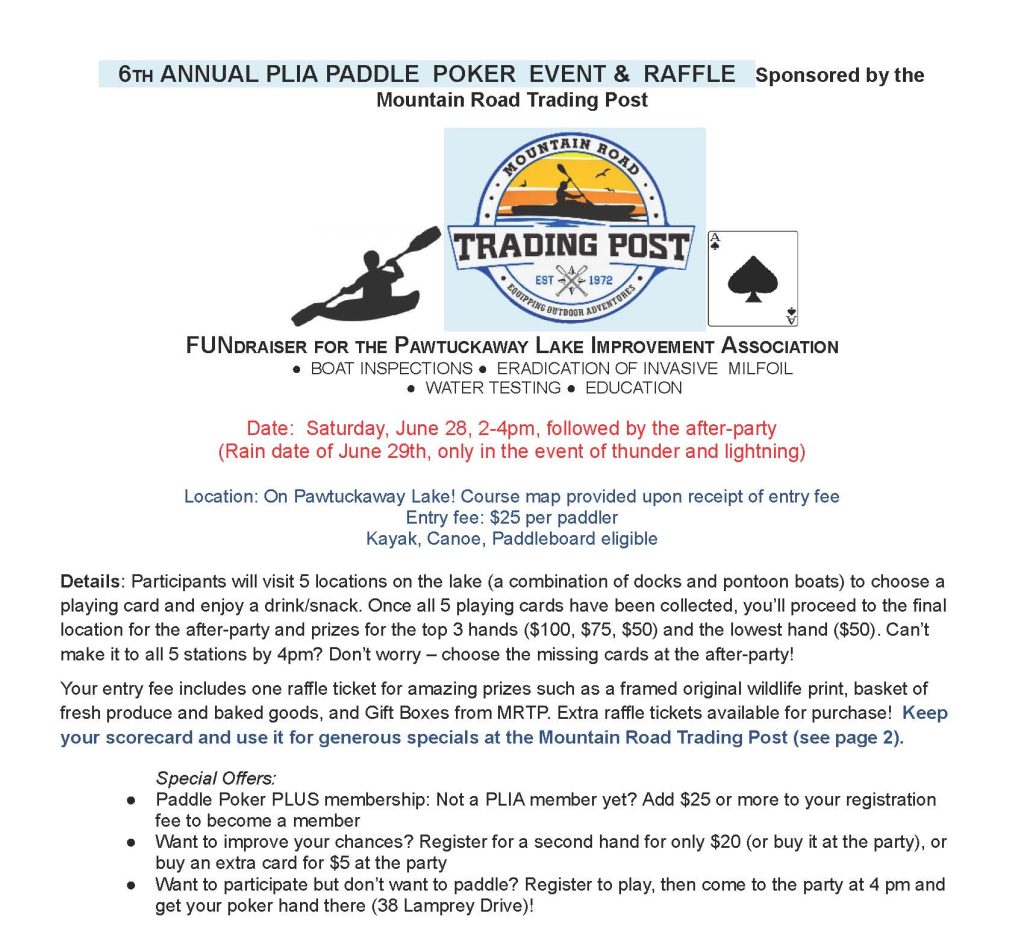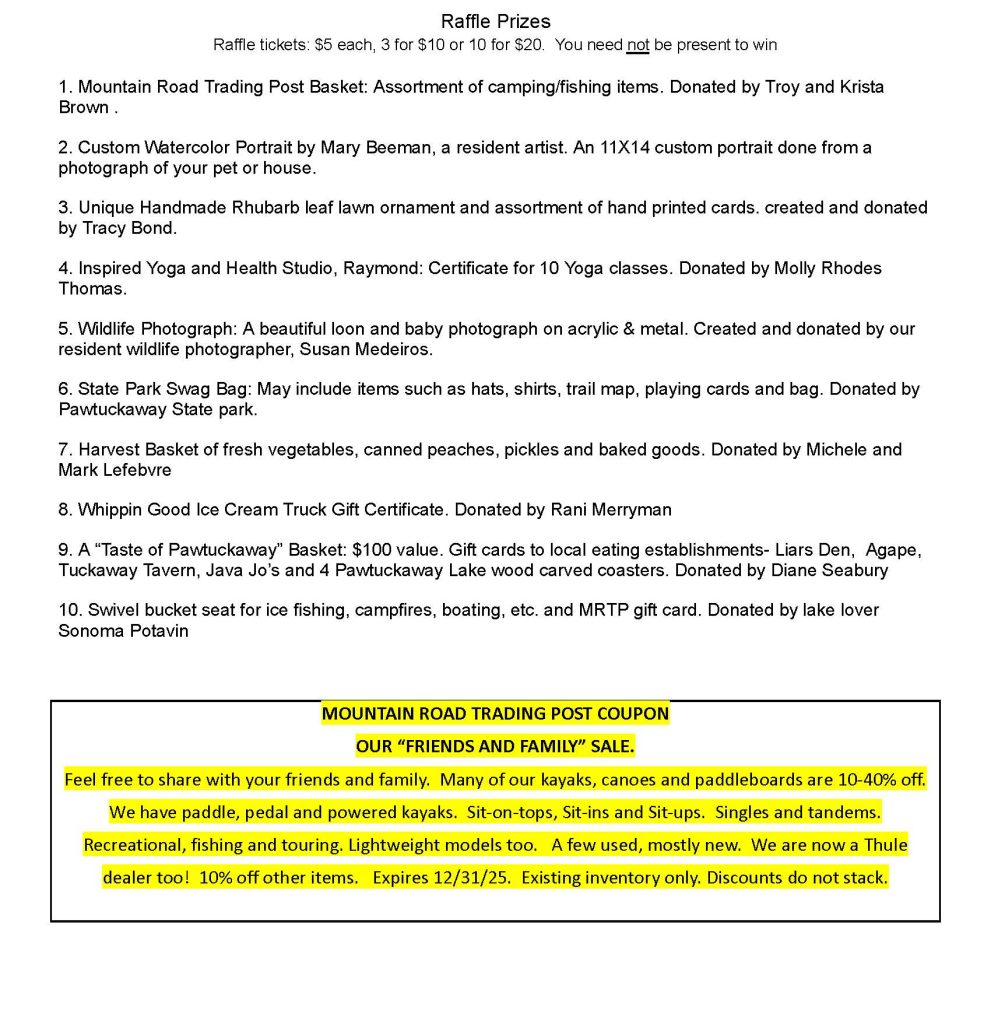In case you missed the PLIA Annual Meeting, here is a recap.
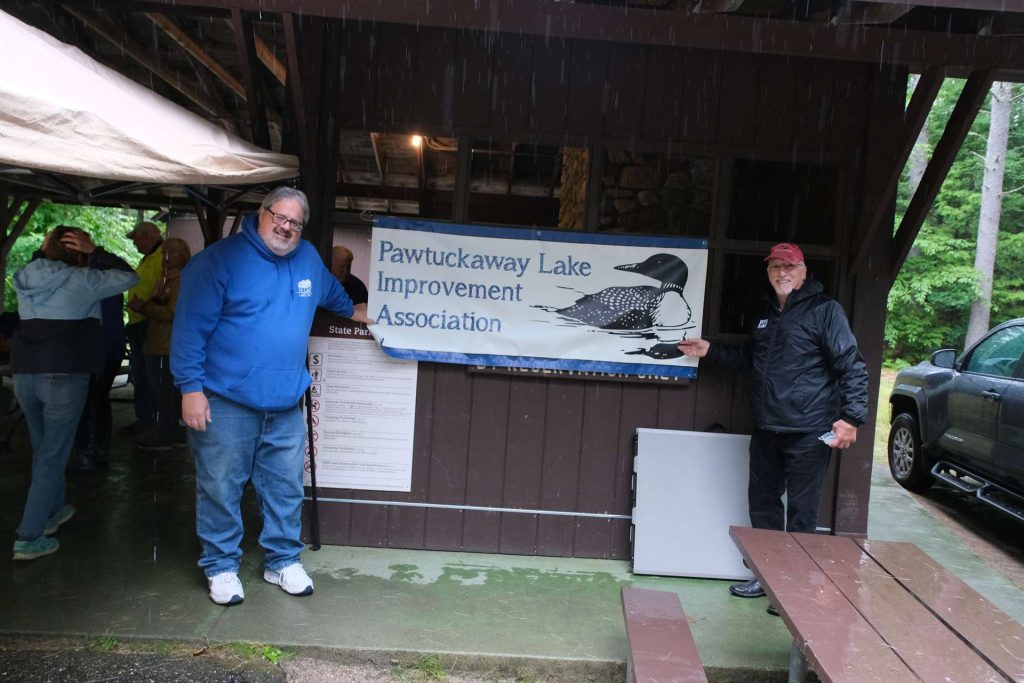 The early rain and chilly temperatures did not deter folks from turning out for the PLIA’s Annual Meeting on June 14, 2025. In fact, with over 127 people at the State Park Pavilion, it was the highest recorded attendance ever! Nottingham Select Board members Charlotte Fyfe and John Decker were present, as was State Representative Scott Pryor. President Tom Duffy acknowledged Park Manager Dave Richardson’s generosity in donating the use of the Pavilion for our Annual Meeting.
The early rain and chilly temperatures did not deter folks from turning out for the PLIA’s Annual Meeting on June 14, 2025. In fact, with over 127 people at the State Park Pavilion, it was the highest recorded attendance ever! Nottingham Select Board members Charlotte Fyfe and John Decker were present, as was State Representative Scott Pryor. President Tom Duffy acknowledged Park Manager Dave Richardson’s generosity in donating the use of the Pavilion for our Annual Meeting.
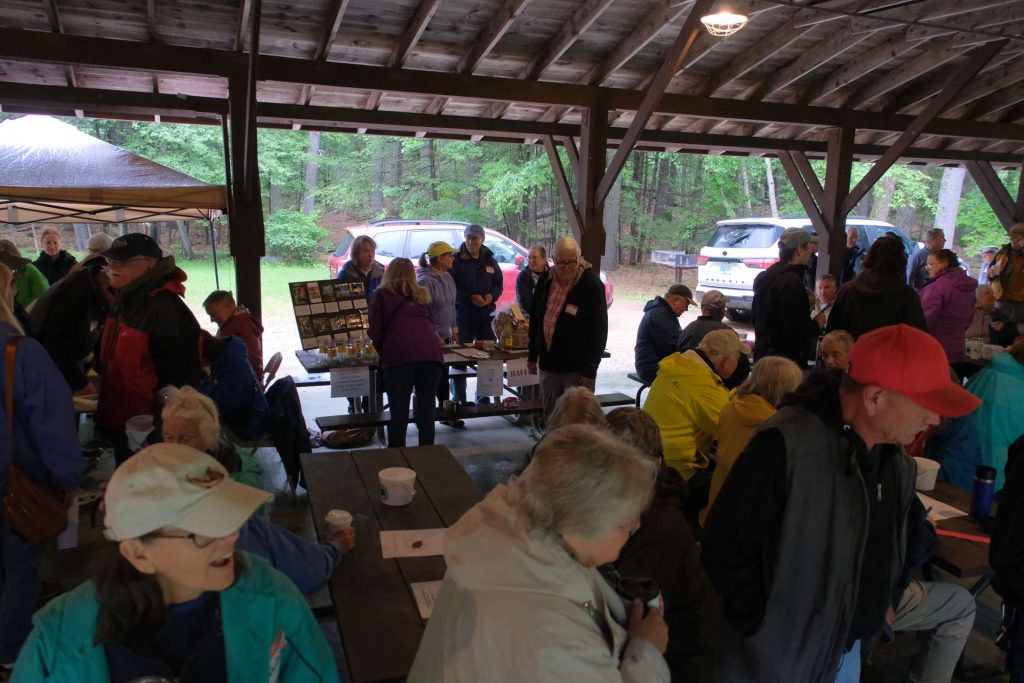 There were three raffles to be given away at the meeting, and plenty of raffle tickets available for the Paddle Poker event scheduled for June 28, 2025. Registering for Paddle Poker was easy, and Pawtuckaway playing cards were on sale as well.
There were three raffles to be given away at the meeting, and plenty of raffle tickets available for the Paddle Poker event scheduled for June 28, 2025. Registering for Paddle Poker was easy, and Pawtuckaway playing cards were on sale as well.
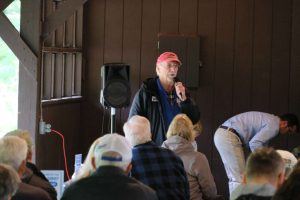 Members voted to elect a slate of nominees to the PLIA Board of Directors, and to change the organization’s fiscal year from June 1 – May 31 to January 1 – December 31. Tom Duffy explained that this amendment to the Bylaws would avoid a lot of confusion, since membership is also on a calendar year.
Members voted to elect a slate of nominees to the PLIA Board of Directors, and to change the organization’s fiscal year from June 1 – May 31 to January 1 – December 31. Tom Duffy explained that this amendment to the Bylaws would avoid a lot of confusion, since membership is also on a calendar year.
Government Liaison Tom Duffy looked back to our success getting approval of the Warrant Article authorizing the Town to apply for a $100,000 grant for the PLIA’s watershed study, and forward to hearing whether we have been awarded the funds.
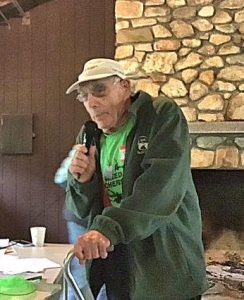 Steve Soreff, Co-Chair of the Weed Watcher program, congratulated Karen Given and Linda St. Pierre on collecting and disposing of 2,000 Chinese mystery snails last summer! He urged everyone to be on the lookout for weeds and snails, inviting attendees to take home telescoping nets at the conclusion of the meeting to keep in their kayaks for capturing Chinese mystery snails.
Steve Soreff, Co-Chair of the Weed Watcher program, congratulated Karen Given and Linda St. Pierre on collecting and disposing of 2,000 Chinese mystery snails last summer! He urged everyone to be on the lookout for weeds and snails, inviting attendees to take home telescoping nets at the conclusion of the meeting to keep in their kayaks for capturing Chinese mystery snails.
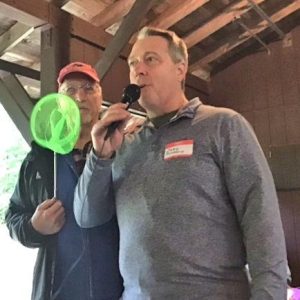 Gary Potavin pointed out the snail collecting buckets donated by his daughter Sonoma that were placed on tables for people to take home with them as well. Tom Duffy announced that Sonoma had raised over $400 from the sales of bucket camp seats she had made and was donating all of it to the PLIA. He added that we need more supporters like her.
Gary Potavin pointed out the snail collecting buckets donated by his daughter Sonoma that were placed on tables for people to take home with them as well. Tom Duffy announced that Sonoma had raised over $400 from the sales of bucket camp seats she had made and was donating all of it to the PLIA. He added that we need more supporters like her.
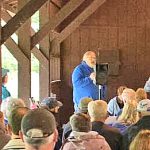 Bruce Henden called for more volunteers for the Lake Host Program, to keep invasive species from going into or out of the lake. Tom Duffy emphasized how easy Lake Hosting can be, and offered to team up with any newcomers wanting to learn the ropes. Bruce encouraged everyone to practice the clean, drain, and dry system of boat care, and to urge friends and neighbors with boats to do the same when using private boat ramps.
Bruce Henden called for more volunteers for the Lake Host Program, to keep invasive species from going into or out of the lake. Tom Duffy emphasized how easy Lake Hosting can be, and offered to team up with any newcomers wanting to learn the ropes. Bruce encouraged everyone to practice the clean, drain, and dry system of boat care, and to urge friends and neighbors with boats to do the same when using private boat ramps.
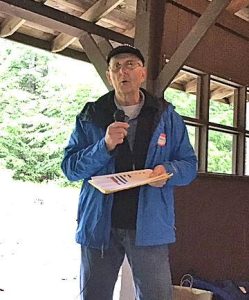 Other reports from Program Chairs included a plea by Milfoil Team Coordinator Neil Santos for more search snorkelers and divers. Milfoil sightings are way down but not eliminated from the lake. Certified Weed Control Diver Jamie Burleigh cautioned members not to let their guard down, because we would like to avoid using herbicide again if it can be avoided. He was pleased to announce a new D.A.S.H. boat that would be available for use on the lake, and hopes to get the Boy Scouts involved in searches again this summer.
Other reports from Program Chairs included a plea by Milfoil Team Coordinator Neil Santos for more search snorkelers and divers. Milfoil sightings are way down but not eliminated from the lake. Certified Weed Control Diver Jamie Burleigh cautioned members not to let their guard down, because we would like to avoid using herbicide again if it can be avoided. He was pleased to announce a new D.A.S.H. boat that would be available for use on the lake, and hopes to get the Boy Scouts involved in searches again this summer.
The next Road Clean Up event will take place on July 12, 2025, at 9:00 AM. Water testing has been conducted on Pawtuckaway since the 1980’s, to monitor water quality and phosphorus levels. Tom mentioned that he is hoping to prevent phosphorus from entering the north end of the lake with holding ponds someday.
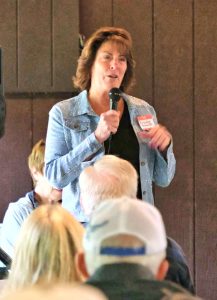 Brooke Schaefer revealed that a new fundraiser is being planned, called Pawtuckaway Games, loosely based on the Amazing Race. Teams of two will engage in timed events on five abutting properties. It is scheduled for September 13, 2025. Stay tuned!
Brooke Schaefer revealed that a new fundraiser is being planned, called Pawtuckaway Games, loosely based on the Amazing Race. Teams of two will engage in timed events on five abutting properties. It is scheduled for September 13, 2025. Stay tuned!
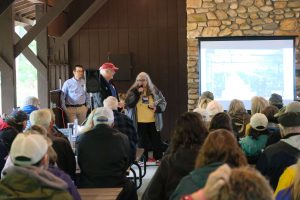 Tom Duffy declared Therese Thompson the winner of the 2024 Local Hero Award. Therese is a long-time supporter of the PLIA, starting back decades ago when she would rise before dawn to volunteer her services as boat inspector when fishing tournaments were scheduled at the Fundy. She and Tom traveled together for meetings with NH DES when our relationship with that agency was in its infancy. She created a booklet for identifying invasive aquatic species and conducted many trainings of Weed Watchers. Therese served on the Board of Directors of the PLIA and even though she has moved from the lake, she remains active in assisting the Board with grant writing and keeping them informed of events and activities of importance within the Lamprey River watershed.
Tom Duffy declared Therese Thompson the winner of the 2024 Local Hero Award. Therese is a long-time supporter of the PLIA, starting back decades ago when she would rise before dawn to volunteer her services as boat inspector when fishing tournaments were scheduled at the Fundy. She and Tom traveled together for meetings with NH DES when our relationship with that agency was in its infancy. She created a booklet for identifying invasive aquatic species and conducted many trainings of Weed Watchers. Therese served on the Board of Directors of the PLIA and even though she has moved from the lake, she remains active in assisting the Board with grant writing and keeping them informed of events and activities of importance within the Lamprey River watershed.
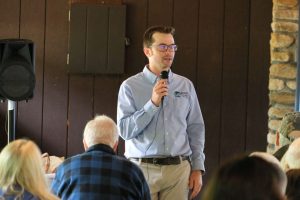 Corey Clark, Chief Engineer of the NH DES Dam Bureau, presented a slide show and spoke about the history of the four dams on Pawtuckaway, starting with their creation around 1800 to supply power to Newmarket Manufacturing. He reviewed studies and repairs that had been conducted over many years, explaining that Drowns and Dolloff Dams are now considered “high hazard” because of the potential catastrophic effects of dam failure and flooding. This also means that their safe condition is a high priority for the State. A copy of Corey’s presentation can be found here.
Corey Clark, Chief Engineer of the NH DES Dam Bureau, presented a slide show and spoke about the history of the four dams on Pawtuckaway, starting with their creation around 1800 to supply power to Newmarket Manufacturing. He reviewed studies and repairs that had been conducted over many years, explaining that Drowns and Dolloff Dams are now considered “high hazard” because of the potential catastrophic effects of dam failure and flooding. This also means that their safe condition is a high priority for the State. A copy of Corey’s presentation can be found here.
Because of their age and deteriorating structures, Pawtuckaway dams are slated for major repairs as soon as funding can be approved and allocated. He projected that construction could happen as soon as 2028 – 2029. In response to questions from the audience, Corey stated that the lake would be lowered 20 feet in the fall, and work would begin as early as possible the following spring, with construction concluding that fall. Filling up the lake starting that winter might be a challenge, but weather events would dictate how quickly that happens.
Tom Duffy concluded the meeting and awarded prizes to the three raffle winners. All in all, a very good meeting!
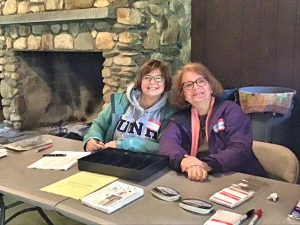
 The early rain and chilly temperatures did not deter folks from turning out for the PLIA’s Annual Meeting on June 14, 2025. In fact, with over 127 people at the State Park Pavilion, it was the highest recorded attendance ever! Nottingham Select Board members Charlotte Fyfe and John Decker were present, as was State Representative Scott Pryor. President Tom Duffy acknowledged Park Manager Dave Richardson’s generosity in donating the use of the Pavilion for our Annual Meeting.
The early rain and chilly temperatures did not deter folks from turning out for the PLIA’s Annual Meeting on June 14, 2025. In fact, with over 127 people at the State Park Pavilion, it was the highest recorded attendance ever! Nottingham Select Board members Charlotte Fyfe and John Decker were present, as was State Representative Scott Pryor. President Tom Duffy acknowledged Park Manager Dave Richardson’s generosity in donating the use of the Pavilion for our Annual Meeting. There were three raffles to be given away at the meeting, and plenty of raffle tickets available for the Paddle Poker event scheduled for June 28, 2025. Registering for Paddle Poker was easy, and Pawtuckaway playing cards were on sale as well.
There were three raffles to be given away at the meeting, and plenty of raffle tickets available for the Paddle Poker event scheduled for June 28, 2025. Registering for Paddle Poker was easy, and Pawtuckaway playing cards were on sale as well. Members voted to elect a slate of nominees to the PLIA Board of Directors, and to change the organization’s fiscal year from June 1 – May 31 to January 1 – December 31. Tom Duffy explained that this amendment to the Bylaws would avoid a lot of confusion, since membership is also on a calendar year.
Members voted to elect a slate of nominees to the PLIA Board of Directors, and to change the organization’s fiscal year from June 1 – May 31 to January 1 – December 31. Tom Duffy explained that this amendment to the Bylaws would avoid a lot of confusion, since membership is also on a calendar year. Steve Soreff, Co-Chair of the Weed Watcher program, congratulated Karen Given and Linda St. Pierre on collecting and disposing of 2,000 Chinese mystery snails last summer! He urged everyone to be on the lookout for weeds and snails, inviting attendees to take home telescoping nets at the conclusion of the meeting to keep in their kayaks for capturing Chinese mystery snails.
Steve Soreff, Co-Chair of the Weed Watcher program, congratulated Karen Given and Linda St. Pierre on collecting and disposing of 2,000 Chinese mystery snails last summer! He urged everyone to be on the lookout for weeds and snails, inviting attendees to take home telescoping nets at the conclusion of the meeting to keep in their kayaks for capturing Chinese mystery snails. Gary Potavin pointed out the snail collecting buckets donated by his daughter Sonoma that were placed on tables for people to take home with them as well. Tom Duffy announced that Sonoma had raised over $400 from the sales of bucket camp seats she had made and was donating all of it to the PLIA. He added that we need more supporters like her.
Gary Potavin pointed out the snail collecting buckets donated by his daughter Sonoma that were placed on tables for people to take home with them as well. Tom Duffy announced that Sonoma had raised over $400 from the sales of bucket camp seats she had made and was donating all of it to the PLIA. He added that we need more supporters like her. Bruce Henden called for more volunteers for the Lake Host Program, to keep invasive species from going into or out of the lake. Tom Duffy emphasized how easy Lake Hosting can be, and offered to team up with any newcomers wanting to learn the ropes. Bruce encouraged everyone to practice the clean, drain, and dry system of boat care, and to urge friends and neighbors with boats to do the same when using private boat ramps.
Bruce Henden called for more volunteers for the Lake Host Program, to keep invasive species from going into or out of the lake. Tom Duffy emphasized how easy Lake Hosting can be, and offered to team up with any newcomers wanting to learn the ropes. Bruce encouraged everyone to practice the clean, drain, and dry system of boat care, and to urge friends and neighbors with boats to do the same when using private boat ramps. Other reports from Program Chairs included a plea by Milfoil Team Coordinator Neil Santos for more search snorkelers and divers. Milfoil sightings are way down but not eliminated from the lake. Certified Weed Control Diver Jamie Burleigh cautioned members not to let their guard down, because we would like to avoid using herbicide again if it can be avoided. He was pleased to announce a new D.A.S.H. boat that would be available for use on the lake, and hopes to get the Boy Scouts involved in searches again this summer.
Other reports from Program Chairs included a plea by Milfoil Team Coordinator Neil Santos for more search snorkelers and divers. Milfoil sightings are way down but not eliminated from the lake. Certified Weed Control Diver Jamie Burleigh cautioned members not to let their guard down, because we would like to avoid using herbicide again if it can be avoided. He was pleased to announce a new D.A.S.H. boat that would be available for use on the lake, and hopes to get the Boy Scouts involved in searches again this summer. Brooke Schaefer revealed that a new fundraiser is being planned, called Pawtuckaway Games, loosely based on the Amazing Race. Teams of two will engage in timed events on five abutting properties. It is scheduled for September 13, 2025. Stay tuned!
Brooke Schaefer revealed that a new fundraiser is being planned, called Pawtuckaway Games, loosely based on the Amazing Race. Teams of two will engage in timed events on five abutting properties. It is scheduled for September 13, 2025. Stay tuned! Tom Duffy declared Therese Thompson the winner of the 2024 Local Hero Award. Therese is a long-time supporter of the PLIA, starting back decades ago when she would rise before dawn to volunteer her services as boat inspector when fishing tournaments were scheduled at the Fundy. She and Tom traveled together for meetings with NH DES when our relationship with that agency was in its infancy. She created a booklet for identifying invasive aquatic species and conducted many trainings of Weed Watchers. Therese served on the Board of Directors of the PLIA and even though she has moved from the lake, she remains active in assisting the Board with grant writing and keeping them informed of events and activities of importance within the Lamprey River watershed.
Tom Duffy declared Therese Thompson the winner of the 2024 Local Hero Award. Therese is a long-time supporter of the PLIA, starting back decades ago when she would rise before dawn to volunteer her services as boat inspector when fishing tournaments were scheduled at the Fundy. She and Tom traveled together for meetings with NH DES when our relationship with that agency was in its infancy. She created a booklet for identifying invasive aquatic species and conducted many trainings of Weed Watchers. Therese served on the Board of Directors of the PLIA and even though she has moved from the lake, she remains active in assisting the Board with grant writing and keeping them informed of events and activities of importance within the Lamprey River watershed. Corey Clark, Chief Engineer of the NH DES Dam Bureau, presented a slide show and spoke about the history of the four dams on Pawtuckaway, starting with their creation around 1800 to supply power to Newmarket Manufacturing. He reviewed studies and repairs that had been conducted over many years, explaining that Drowns and Dolloff Dams are now considered “high hazard” because of the potential catastrophic effects of dam failure and flooding. This also means that their safe condition is a high priority for the State. A copy of Corey’s presentation can be found
Corey Clark, Chief Engineer of the NH DES Dam Bureau, presented a slide show and spoke about the history of the four dams on Pawtuckaway, starting with their creation around 1800 to supply power to Newmarket Manufacturing. He reviewed studies and repairs that had been conducted over many years, explaining that Drowns and Dolloff Dams are now considered “high hazard” because of the potential catastrophic effects of dam failure and flooding. This also means that their safe condition is a high priority for the State. A copy of Corey’s presentation can be found 
